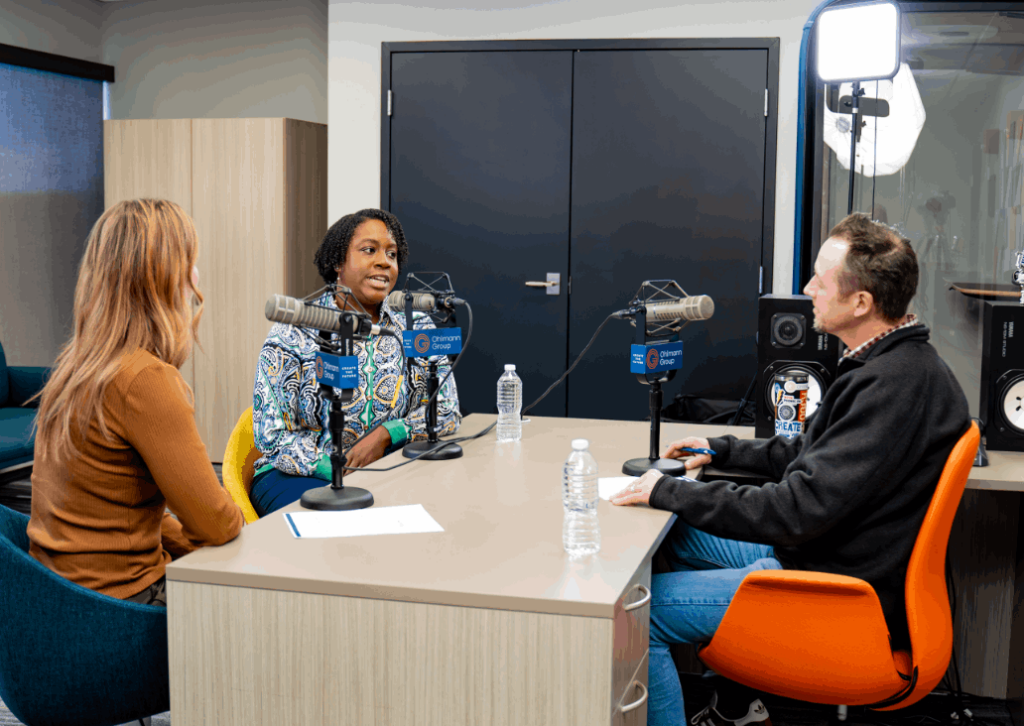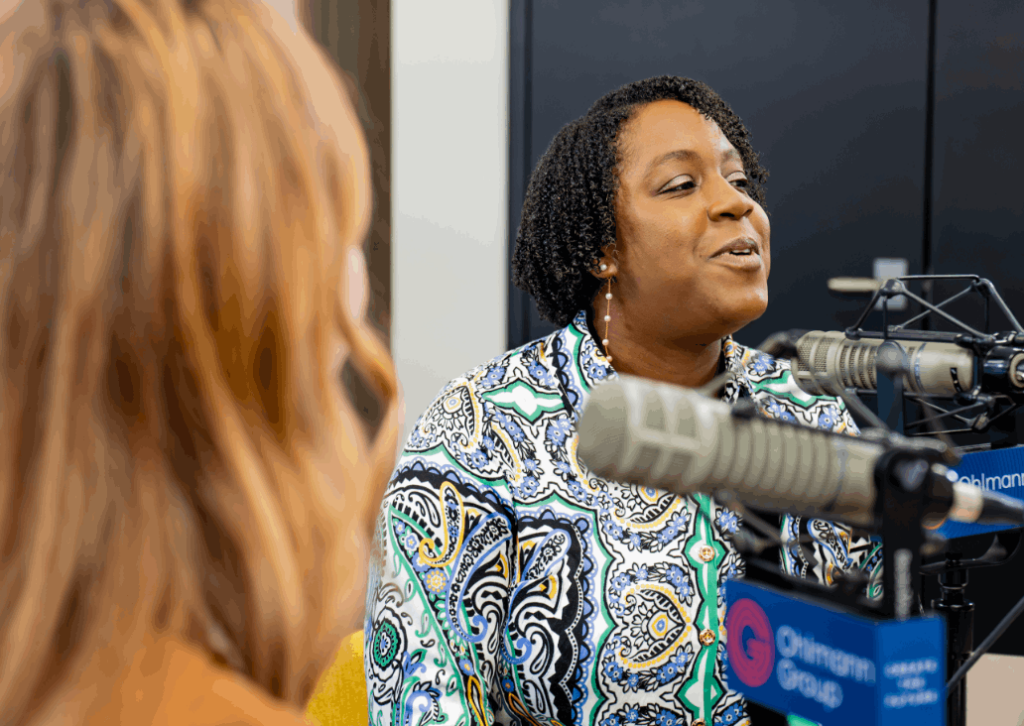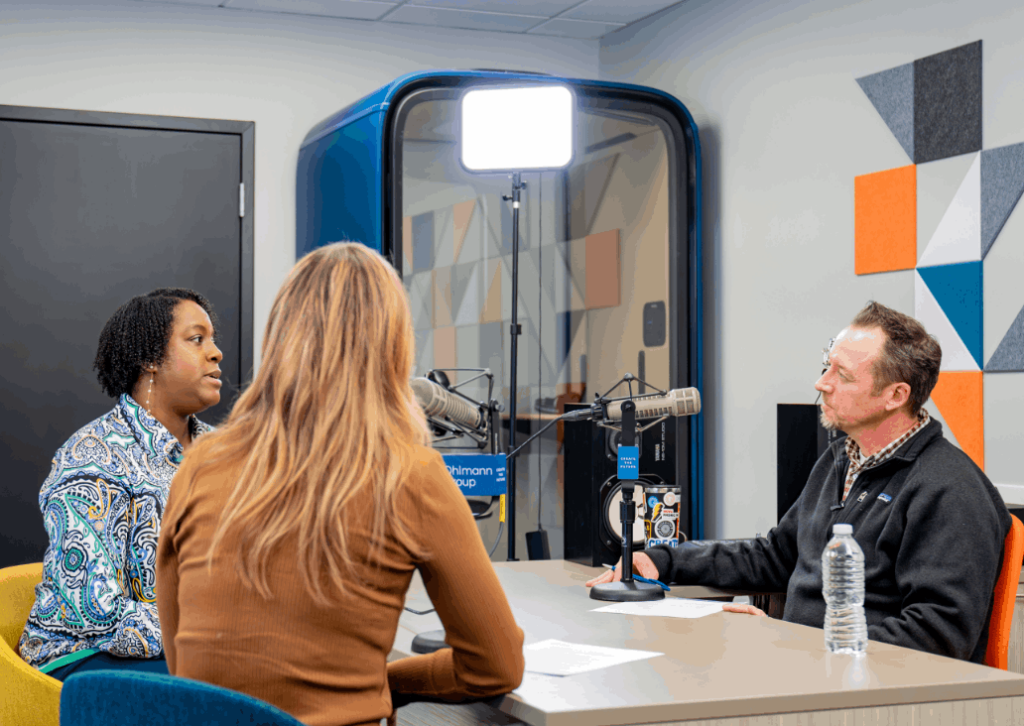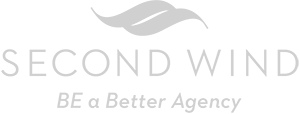Myla Cardona-Jones is the CEO of the Brunner Literacy Center, empowering adults to live better lives through literacy. With over two decades of experience spanning the service, education, marketing, and legal sectors, Myla is recognized as one of the most dynamic leaders in the Dayton region.
Hear more about Myla’s personal journey and her passion for creating a brighter future in the Dayton region through the life-changing power of literacy.
Listen Now!



Episode Transcript
Evelyn Ritzi: Welcome to Creating the Future. I’m Evelyn Ritzi.
David Bowman: And I’m David Bowman.
Evelyn: And today we’re joined by a passionate community leader and the CEO of the Brunner Literacy Center. It’s Myla Cardona Jones, welcome.
Myla Cardona-Jones: Thank you so much. Thanks. Excited to be here. Thank you.
Evelyn: We’re so excited. So let’s start at the beginning. Myla, you have such a fascinating background with experience in legal education and nonprofit work, just every, you’re doing everything all at once. So we’d love to hear about your career path and how it led you to your role at the Brunner Literacy Center.
Myla: Yeah, it’s been very nontraditional. I’ll start off by saying that, you know, if I can tell you all the truth, I started off wanting to be a pediatric oncologist. So, yeah, I am not a pediatric oncologist, as you all know, and so I started off with this passion for wanting to help people. And you know, that has been the one consistent stream, always, every career, every job, it’s involved helping people. But I started off, you know, with this path of wanting to go into medicine, and very quickly realized that’s not really the journey I wanted to take. And actually, after I graduated with my first bachelor’s degree, I went into the service industry. I was a server and a bartender for five and a half years when I lived in DC, and I loved it. I absolutely loved it. I loved everything about it. Got to meet different people. The place I worked was actually at a restaurant right next to the White House. And so, I mean, literally, anybody you could think of, I probably served them at some point. So it was just really, really cool, like Arnold Schwarzenegger, like all kinds of really cool people. Seriously, it was awesome. And so then I got married and had a child and decided to move back to Dayton, Ohio. And that is when I realized the service industry is a little different here, and I may not be able to continue kind of down that path. And so I did a Google search one day. I was like, what kind of jobs can you get, you know, with these degrees and these skills, and paralegal popped up as one of the options. And so I was like, Okay, let me look into that. So I applied at Sinclair, earned my paralegal degree, started working in immigration law. Loved it, was super passionate about it. And then one day, really started to assess all the things that I was doing. And I was like, you do a lot of the work of a lawyer. Why not become one? Yes, and that’s exactly what I did. I went to law school. Mind you, along this entire journey, my husband is just staring at me like I’m crazy. He’s like, so you’re getting another degree. Great. Go do that. But very supportive always. And so I went to law school. I actually started working at LexisNexis. I had maintained a really, really close relationship with the teachers from Sinclair, and they reached out, and they said, Hey, we think you’d be a really great educator. Have you ever thought of that? And I was like, Absolutely not. No. Like, I’m a lawyer. I’m gonna practice law. I’m not interested in that. And they’re like, why don’t you just try teaching one class? Would you be interested in one class? And so I did, and then it hit me like a freight train. I was like, Ooh, I do love teaching. I’m really into this. And about six months later, they offered me a full-time professor position, and that’s kind of the journey that I’ve been on ever since, has been this love for education, marrying it with the law, and this desire to want to help people and meet them wherever they are. So that’s kind of what brought me to BLC, because it really marries all of the things that I’m passionate about.
David: Yeah, and I love how, I mean, what you’re describing is more of a journey than a destination, right? And I think that’s a great way to approach life is not to not stop learning and growing and exploring and just challenging yourself, right?
Myla: Absolutely. Yeah, I think, you know, sometimes we think we have this path, right, and like the. This is what I’m supposed to be doing, but it’s been really refreshing and exciting to just allow the journey to happen as it should, and it’s led me to some beautiful experiences, and I’m glad that I was willing to take that ride. So it’s important,
David: Yeah, and certainly, experience in the service industry, particularly bars and restaurants, is life-changing.
Myla: Yes, every, every one of my best skills comes from serving, waiting tables, absolutely hands down, every single one of them. So it really prepares you for many of the challenges of life.
David: Yes. So at BLC, you’re committed to the belief that literacy is a basic human right, which is really powerful statement. So talk about what that means to you personally and why literacy is so crucial, and particularly crucial here in Dayton.
Myla: Yeah, it really is. It’s something that for me, I think about, you know, my childhood. I think about the opportunities that I experienced, and I definitely had a level of privilege, as I know not everyone is experiencing in the Dayton community, you know, I grew up going to the library probably every four or five days, because I read through all of my books so quickly that we had to get back to the library, you know. And just having so many experiences. And what was really cool is when I started traveling a lot and being able to apply the things that I’d read about, and then seeing them, like, oh, the Eiffel Tower and just all these things. I mean, letting stories come to life is just so cool. But also not everybody has the ability to allow the stories to come to life. And so reading connects people. It allows you to share in these experiences, whether you see them in person or not, and it also just helps you grow as a person, right, and have an appreciation and a value for so many different things. And so when we talk about, you know, literacy being this basic human right, we’re talking about access. We’re talking about opportunities. We’re talking about people being able to see themselves and want to have experiences outside of maybe what they’ve been subjected to in their communities, right? Like opportunity. And, you know, we’re doing this work. And I’ll just, I’ll share a quick story. We’re doing this work for adults, right? We’re an adult literacy nonprofit, but over the past about nine months, we started saying we really need to stop being so excited about all these adults that are coming to us. This is actually not the best thing that’s happening, right? We’re happy to support adults. We’re happy to serve them, but what can we do as an organization to prevent the number of adults coming to us? And so we’ve started stepping into the youth literacy space, and one really great partnership we have is we’re in Thurgood Marshall, and we’re working in the reading labs with ninth graders, and we’re reading with them. And what’s so cool is, like they start off and they are saying, Oh, I don’t want to do this. Like, this like, this is not cool. I don’t want to read. And we’re reading this book right now, and they are so into it, and it is just so cool to see that come to life, and then they ask questions and they want to learn more. And so literacy literally opens doors and changes people’s perspectives and gives them hope. That’s why it’s a basic human right?
David: It just unlocks so much of the human experience, right? And not and at so many levels, right? From a personal, just functional level, as you move through the world, reading is helpful, but from a creative level, from a connection level, as you said, it can take you all around the world from where you are. And it’s a reading is a slower medium, like words take time and concentration, yes, which is requires thought and personal interpretation. And, you know, it’s, it is a different experience. Yeah,
Myla: Absolutely. And, you know, I think what’s also important to note too, is it’s something that I think is kind of a great equalizer, because we are going to all have different experiences. That’s the reality. But in a book, we can all come together and have a conversation where, you know, it doesn’t matter where you’re from, what your background is, even what language you speak, we can all kind of share in an experience. So that is just really powerful, and something that I think, I hope, everyone starts to have access to,
Evelyn: That’s key to the work that you’re doing. Can you talk a little bit about, okay, what is the Brunner Literacy Center? What takes place in a typical day there? Because there’s so much that happens from GED prep and ESL. And can you talk about that a little bit?
Myla: Yeah, typical day. That’s kind of, you know, it’s like, what is a typical day. But I’ll tell you, the better Literacy Center, you know, it is an adult literacy nonprofit. We are, you know, committed to serving adults and also now families, to provide access to resources that maybe they didn’t have. Other. Wise, or, you know, a refresh on certain things as they go on to advance in different degrees and certifications. So we have four core programs. We offer free one on one tutoring. We have adult basic education programming. We have GED programming, continuing education, which, like I said, looks like any and everything. We currently have an engineering student who’s here to get help for statistics, right? And, like, frankly, who will, who doesn’t need help with statistics? I’m like, can I sit in all these classes? I don’t know statistics either, right? And then we have ELL programming as well. So we’re supporting our immigrant refugee community, teaching them how to speak English, and then also helping with their citizenship test. So it looks like anything possible. I mean it, you know, we get to see the action happening in the space around us. Like I said, it’s one on one, so it’s individualized. And it really just looks like, you know, people who care and are passionate about literacy coming together to support others in need.
Evelyn: That’s wonderful. And you know, to tie it back to creativity and collaboration and everything that we focus on here with this podcast, can you talk a little bit about how creativity is used when addressing adult education and different ways that you approach it? You know, it’s a one-on-one situation, but what are some of the ways that creativity ties into it?
Myla: You have to be creative when you’re dealing with adult learners. There’s, there’s really no other option. You know, you have to be creative with kids too. So let me just start by saying that. But you know, adults are bringing in a whole different host of challenges. You know, into the learning experience. They have their own children, responsibilities, work obligations, even just kind of a little bit of shame that comes along with, you know, I haven’t attained these goals at the age that society says I should have. And so you have to be willing to meet people where they are, and be open to pivoting when that’s not working, right, when your normal process, or that book that you’ve been given that says, like, this is the level they’re at. So start with that. If that’s not working, you have to be open to changing that process. And you know, that’s what our program team is there for. We’re always open to, okay, this isn’t working, let’s pivot. Let’s talk about what the interests are, right? And we as an organization have really tried to be creative in how we look at literacy, too. So it’s not just a book, it’s financial literacy, it’s, you know, immersive learning. Sometimes when you’re reading a book and you maybe don’t have the ability to make the connections, how can we as an organization, do that? And so we have started these immersive bus learning experiences where we take our students, adult learners, you know, on a big bus, and we drive around Dayton, and we go to places that maybe they didn’t go to when they were in school. And it’s so cool to see because they’re just as excited as the kids are, and they’re hopping off the bus and they’re, you know, eager to learn. So I think as long as you’re willing to meet people where they are, that creativity looks different for every person, but it happens, and I didn’t mention too. We also work with the ripe old building, the Common Pleas Court, and so we deal with adults that are also court involved, and that’s where some of our best creativity comes out. Because, you know, some of them maybe don’t want to be there, but we find ways, again, to really challenge their brain and to make them think differently by encouraging and supporting and offering math clinics, because that seems to be a big hold up for everyone with a GED you just have to be willing to sit down on a level with people and have a conversation and then, and then adjust accordingly.
David: Yeah. And I assume you know, as you said, kids don’t have quite so much baggage of life, right? And there, there’s a lot more, just neuroplasticity, right, right? They can be flexible and learn new things, and their brains are growing, and they’re just interested like sponges. As adults, we sort of get set in our ways and think, I can do this, I can’t do that. We sort of set these limitations on ourselves that I assume that creativity has to work around right, and getting people to believe in themselves a little bit, even just yeah, you can do this. Yeah.
Myla: Have you all experienced a two year old, like in the “nos” right? Like two-year-olds say no all the time, Oh, yeah. And then try adult learners, they say no a lot too, and you’re like, yes, and they’re like, No, and you’re like, yes, you can do this. It really is kind of reverting back to when you’re taking care of your toddler and and then finally, one day they realize, like, oh, I can do this. And they have the same level of excitement. And that’s just really, really cool to see. Be an adult, you know, reach their potential and see that they can do it, and then they earn their GED and then they want more, right? And now they’re applying for, you know, their college degree or looking for certification at their job, and we’re able to continue to support them in that journey. So we are really big on turning those no’s into yeses, yeah,
David: You create that growth mindset that then once it starts to click, the hopes there, the beliefs there, and then those barriers start to come down, I would think
Myla: Absolutely, absolutely. And then the holistic services that we provide is super important too. Because, again, most of the reasons that you know, someone’s coming to us is not just a literacy deficit. It’s not just low literacy, you know, there’s a lot of other barriers, so we’ve really been intentional about partnering with other organizations to support that person holistically and to offer those services.
David: So even outside of your role at BLC, you are a force in our community, dedicating much of your time to the service of others, and something we really appreciate is your transparency and how you share what your days look like as a CEO. So what motivates you to be so involved in the Dayton community? And I personally am interested in how do you find balance as a CEO?
Myla: So first of all, I’m born and raised here, right? So it’s like, you got to be passionate about the community that raised you. I mean, you just you don’t have any other option, I hope, right? So I’m passionate about Dayton, because it is the community that shaped me into the person I am, and I would love for everyone to have, you know, the same opportunities, and for this community to just be kind of the model city across the nation, honest internationally, right? We have the potential so that that desire to want to see Dayton be the best reflection of itself is what keeps me motivated. I also love the synergy, like I love being downtown. I love walking around. I love all seeing organizations come together. I just feel like Dayton is just a special place, and the more people that can know about it, the more that I personally can share about the things that I’m doing on social media. And then people will reach out and they’ll ask me questions, like, hey, how do I get involved? I love that. Like, yeah, you want to get involved because we’re doing some really amazing things, and more people should know about it. So I think it’s important to share, if you have kind of, you know, a platform of any kind to share, to do that, to share your message, to talk about the wonderful things that we do, to bring more people into the fold. So I think that that’s, you know, really important. And I also feel like, if you have the privilege to, you know, be in certain situations where you can influence and maybe change someone’s perspective about different people, I feel like you have the obligation to do that as well. And so I really It empowers me to wake up every single day to think I might change someone’s mindset. I might be able to help someone be a better reflection of themselves. And selfishly, I also grow as a person too, right like the more I get to interact with people and learn about the community, I’m also growing, and it helps me to be a better leader and balance, honestly, balance looks like bringing my child to everything. So I don’t know if you call that balance like, I feel like he should be here in the seat. You ask him, he seems to enjoy it.
Evelyn: I think so, we’ve been in like, a board meeting, and he’s reading a book.
Myla: Yeah, I think he’s open to it. And I think it’s good for the next generation to see what you’re doing and for them to get excited, right, so that they can step into those roles. You know, we recently had a conversation, and he was like, you were like, a really young CEO. And I was like, I guess technically, and he’s like, that’s really cool, you know, like those little comments, man, like, warm your heart, and I hope I’m creating a good influence for him to see that he can be anything that he wants to be. So balance just looks like being able to bring my child along and having a supportive husband definitely helps as well, for sure.
Evelyn: So we’re talking about literacy. We have to talk about books. So David and I talk about books all the time, constantly. He’s more of a non fiction person. I’m a little more on the fiction side. But as someone that’s, you know, so deeply invested in literacy, could you talk about, maybe what you’re reading right now, or what is like all time favorite book?
Myla: Ooh, I’ll go with now, because, as I mentioned, you know, we’re doing our work in Thurgood Marshall, and so we’re reading a really cool book with them called just a hero by Sharon Draper. And it is one of those books that just is so descriptive and in nature that you can’t help but get hooked. And so like I said, the kids started off and they weren’t really into it, and then. And within like, the first nine pages, they were like, ooh, it’s getting interesting. And I was like, yeah, it is. And to the point where I was like, Can I take this home and, like, read ahead, you know? And they’re like, we’re reading as a group, but it’s just, it’s a really, really cool book, and it’s actually a trilogy. And so now I’m wanting to go and read the rest of the books. And I think that’s, that’s the power of a book, right? If it makes you want to read the next one and the next one, and, you know, stay with that author. So Sharon Draper is just a fabulous writer, and so that’s the one I would mention now, now I have to add that to my list.
David: If folks are listening and inspired to get involved with the Brunner Literacy Center, whether as a student or as a volunteer. How could they do that?
Myla: Yeah, and I appreciate you saying that, because oftentimes they’ll say, how can we volunteer? No like, how can you be a part of the mission? Whether you need the services or you’d like to support the services, it’s a similar process. So first and foremost, we are open Monday through Thursdays. From 8:30 to 4:30 you can call 937-567-9600, and you can also do drop-ins. So anytime you want to stop by, our main site is in Trotwood, Ohio, off Shiloh springs, and you can just walk into the center and let us know that you’re interested in either applying for our tutor application, or if you want to be a student, and we can just get you started with that process right there. We do also have a website so you can visit, if you just search, Brunner Literacy Center, it’ll pop up for you, and it’ll show you, kind of the different ways that you can get involved with the work that we do. That’s great.
Evelyn: So, that brings us to our last question, something that we ask all of our guests, and I’m sure you’ll have a phenomenal answer to this, but what’s the future that you want to create in Dayton?
Myla: That is a loaded question, right? There’s so many things that I want for Dayton, Ohio, but I think if we’re keeping in the lens of literacy. I really would love it if I could drive, or you could drive, or anybody could drive down Main Street, and the access to opportunities and resources do not change as a direct result of the zip code that you’re in. Like I would love that. I would love it if Main Street looked equitable for all people, no matter the school district that they’re in. And so that just looks like more synergy, that looks like more organizations coming together to support one another, that looks like, you know, schools coming together to support one another, that looks like our legislators and public officials doing the work even more than they already do to support and families wanting to see every family succeed and have access. And so I would love that in my lifetime if literally, Main Street looked the same, opportunity-wise, for all people, wouldn’t that be awesome?
Evelyn: I love that future. Thanks so much for being with us, Myla. Myla: Thank you so much for having me. It was so fun.

